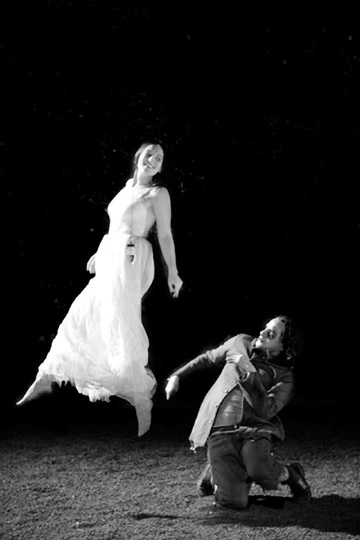Once Upon “A Midsummer Night’s Dream”

In the American Repertory Theatre´s performance of “A Midsummer Night´s Dream,” Puck holds a fairy aloft. (Photo courtesy of American Repertory Theatre)
February 13, 2004
The American’s Repertory Theatre’s production of “A Midsummer Night’s Dream” was by turns, sluggish and delightful. Although the February 8 performance started slow, Shakespeare’s comedy of marriages was well on its way to giving the audience a much-needed kick in the gut by the second half. It’s difficult to know where to start when describing this multi-layered plot. Should one focus on the mechanicals of rehearsals and performance, the cross-paths of the lovers, the marital spat of the Fairy King and Queen, or the marriage of the Athenian legend Theseus to his fiery Amazonian bride Hippolyta?
The whole play had an unreal feel to it, maybe it was the haunting music or the fairies flying through the air on glinting guide wires. Even the mischievous Puck, Jesse J. Perez, seemed a touch sinister with his “Crow” make-up and eerie smile. It was an interesting take on a well-known comedy, treating it as something darker, though the mood lightened considerably in the final act, once the magic of “Pyramus and Thisbe” took over.
Not to be missed was Karen MacDonald in the dual roles of the silently broody, moody Hippolyta and the sensual, willful Titania. She proves she can do “dizzy in love” as well as diva when she acts out the farcical and rather raunchy faux love scene between Titania and the donkey-headed Bottom, played by Thomas Derrah. The ability to switch between the doppelganger roles is impressive and disturbing when the audience is once again confronted with the stern visage of a conquered queen.
Derrah, however, dominated the stage with the over-reaching personality needed to play Nick Bottom. Whether it meant sitting on piano keys or duct-taping and sticking his tongue into the ear of a cringing Snout/Wall (Will Peebles), Derrah proved capable of breathing humor into even the smallest actions. He and his fellows Mechanicals, Starveling (Jonathan Broke), Snug (Jeremy Geidt), Peter Quince (Will LeBow), and Francis Flute (Remo Airaldi) mixed perfectly to entrap the audience’s attention whenever it might wane during the sometimes trying chase and floating fairy scenes.
The opening act went smoothly with the progression of the lovers into the forest, even though Michi Barall, as the constantly quavering Hermia, seemed to be permanently stuck on the edge of tears. However, Katharine Powell, as Helena, and Tug Coker, as Lysander emerged early on as characters capable of breaking up the settled pace and working the audience up to the eventual confused rendezvous. Only later did Demetrius (Daniel Talbott) seem to emerge when it came time to woo Helena.
The minor changes, including the elimination of Theseus’ manservant Philostrate, meant that a play that could stretch to four hours ran a little over two. This version managed to incorporate minor the hijinks without forcing the actors’ to trip over one another’s lives. Seeing as how Shakespeare, and Elizabethan English overall, can be hard to swallow and follow, I’d rate this performance an A for its ingenuity and overall hilarity.










































































